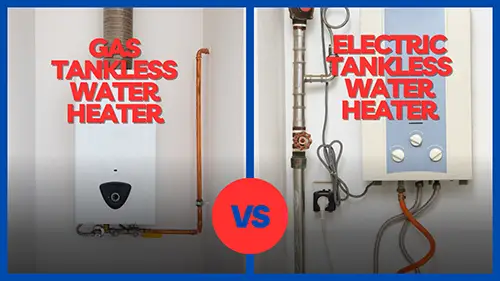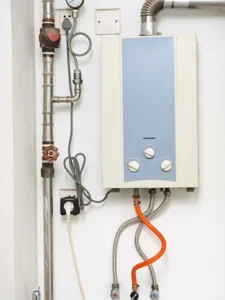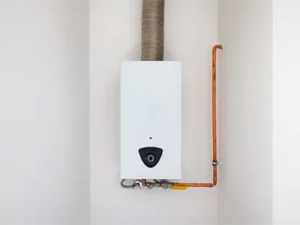 Tankless water heaters are a hot topic for homeowners looking to save on energy costs. These devices heat water on demand rather than storing it, which can lead to serious savings over time. But when you’re standing in the plumbing aisle or on your favorite home improvement site, you’ll likely hit a fork in the road: gas or electric?
Tankless water heaters are a hot topic for homeowners looking to save on energy costs. These devices heat water on demand rather than storing it, which can lead to serious savings over time. But when you’re standing in the plumbing aisle or on your favorite home improvement site, you’ll likely hit a fork in the road: gas or electric?
It’s not a simple choice. Each type has its benefits, drawbacks, and quirks. The decision will depend on your hot water needs, energy costs, and what kind of installation your home is ready for. Let’s break it down, starting with some key takeaways.
Key Takeaways:
- Initial costs for electric tankless heaters are lower, but gas heaters tend to be more efficient for high-demand households.
- Installation for electric models is simpler, but they may require electrical upgrades in older homes. Gas models need venting and gas lines.
- Maintenance on gas heaters is more involved and they require regular upkeep, while electric models tend to be lower maintenance.
- Efficiency: Gas heaters provide a consistent hot water supply, especially in large homes. Electric heaters might struggle if multiple appliances are running at once.
- Environmental Impact: Electric models are greener, while gas models have a bigger carbon footprint.
Understanding Tankless Water Heaters
Tankless water heaters heat water as needed, just as their name implies. Traditional water heaters keep a tank of hot water at the ready, which wastes energy keeping that water warm 24/7. With tankless systems, cold water flows through the unit, heating up instantly through either a gas burner or an electric element.
The appeal? You’re not paying to heat water you aren’t using. Plus, they take up far less space than traditional units.
But, as with most home improvements, the devil is in the details. Gas or electric, each has its strengths and weaknesses.
Electric Tankless Water Heaters
 Pros:
Pros:
- Lower upfront cost: When you first buy an electric tankless water heater, it’s going to be cheaper than its gas counterpart. The cost of the unit itself is lower, and installation tends to be more affordable too.
- Easier to install: Electric models don’t need a gas line or venting system, which simplifies the installation process. This can be a real game changer for homes that aren’t already set up with a gas line.
- Perfect for smaller homes: Electric units work well in homes where hot water demand is lower—think a small family or a couple with one bathroom. They’re also ideal when space is tight, as they can fit almost anywhere.
Cons:
- Lower flow rate: Electric heaters don’t pack as much punch as gas models. They can struggle to provide enough hot water for the use of multiple appliances.
- Possible electrical upgrades: If you live in an older home, you might need to upgrade your electrical system to handle the demands of an electric tankless heater. That can add to the installation cost.
Gas Tankless Water Heaters
 Pros:
Pros:
- Handles high demand: Gas tankless water heaters shine in homes where hot water is used in multiple places at once—think showers running, dishes washing, and laundry going. Gas heaters generally offer a higher flow rate, meaning they can supply more hot water faster.
- Long-term savings: While the initial cost may be higher, gas units can save you money in the long run, especially if you live in an area where gas is cheaper than electricity.
- Reliable hot water supply: Gas models are more efficient at heating water quickly and consistently, which makes them a good option for bigger families.
Cons:
- Installation is more complex: A gas tankless water heater needs both a gas line and venting, which can add significant cost and time to the installation process. If you’re not already set up with a gas line, you’re looking at a bigger project.
- Maintenance needs: Gas units require regular upkeep, including vent cleaning and checking for gas leaks. It’s an ongoing commitment.
- Environmental impact: Burning natural gas has a greater environmental impact than using electricity, especially if that electricity comes from renewable sources.
Propane Tankless Water Heaters
Pros:
- High capacity: Propane heaters can handle up to 11 gallons per minute, which is more than most electric units can manage.
- Ideal for rural areas: If you don’t have access to natural gas, propane is a solid alternative. It’s often used in areas where gas lines aren’t readily available.
- Greater heating ability: Compared to electric models, propane offers more consistent heating power, especially in colder climates.
Cons:
- Higher fuel cost: Propane tends to be more expensive than natural gas. If you’re planning to use it heavily, those costs can add up.
- Venting and altitude issues: Like natural gas heaters, propane models need venting. And if you live at a high altitude, you may need special adjustments for your heater to work correctly.
- Propane tank maintenance: You’ll also need to install and maintain a propane tank, which is an extra task electric users don’t have to deal with.
Key Factors to Consider Before Choosing a Tankless Water Heater
Utility Services Available
Before you even start thinking about gas or electric, check what services are available in your area. If your home doesn’t have natural gas lines, you’ll be choosing between electric and propane. If you already have gas, a gas tankless heater could be an easier fit.
Energy Costs
Next, think about energy prices where you live. Gas prices tend to fluctuate, and what’s true today might not be true tomorrow. If gas is cheap in your area, a gas tankless heater could pay off over time. In areas with high electricity prices, electric models might not make financial sense long term.
Hot Water Demand
What’s your household like? If you’re a large family with multiple bathrooms, a gas heater is probably a better fit. Gas models provide more hot water at once. On the other hand, if you’re in a smaller household, an electric tankless heater may supply all the hot water you need.
Installation Costs
Switching between gas and electric can come with serious installation costs. Installing gas lines or upgrading electrical systems isn’t cheap. And don’t forget that gas heaters need proper venting, which adds to the complexity and cost of the installation.
Venting Requirements
Venting is a must for gas tankless water heaters. It’s a safety issue, as you need to get the exhaust gases outside your home. Electric models don’t need venting, so that’s one less thing to worry about with an electric heater.
Maintenance
Gas models require more hands-on care. You’ll need to clean out vents, check gas lines, and schedule regular maintenance checks. Electric models are simpler in that regard—less maintenance, and fewer headaches.
Groundwater Temperature
Groundwater temperature plays a big role in how efficient your tankless water heater will be. If you live in a colder climate, a gas tankless heater will do a better job of heating that cold water fast. If you’re in a warmer area, an electric model may work just fine.
Service Minds Benjamin Franklin Provides Water Heater Services
 At Service Minds Benjamin Franklin Plumbing, we specialize in everything water heater-related. Whether it’s gas, electric, or propane, our team of punctual plumbers can install, repair, or replace your tankless water heater. We believe in doing the job right, and we know the ins and outs of every type of system.
At Service Minds Benjamin Franklin Plumbing, we specialize in everything water heater-related. Whether it’s gas, electric, or propane, our team of punctual plumbers can install, repair, or replace your tankless water heater. We believe in doing the job right, and we know the ins and outs of every type of system.
Need help deciding which tankless water heater is best for your home? Our team is ready to guide you through the process and answer any questions you may have. Contact Service Minds Benjamin Franklin today to set up an appointment and get the hot water flowing.
FAQs
Got questions? We’ve got answers. Here are some of the most common queries about tankless water heaters.
Do gas tankless water heaters work better than electric ones?
It depends on your needs. Gas models work better for high-demand households, while electric models are great for smaller homes.
Can I install a gas tankless heater if I don’t have a gas line?
You’ll need to install a gas line, which can add to the cost. You might want to consider propane as an alternative.
Do electric tankless water heaters use a lot of electricity?
They do use a fair amount, especially when heating cold water quickly. But they’re still more energy-efficient than traditional water heaters.
What’s the average lifespan of a tankless water heater?
Both gas and electric models can last up to 20 years with proper maintenance.
Do tankless water heaters qualify for tax rebates?
In some cases, yes. Check with your local utility company or look for federal rebates that reward energy-efficient upgrades.
Final Thoughts
Both gas and electric tankless water heaters come with their pros and cons. If you’re looking for a system that handles high demand, gas is the way to go—especially in colder climates. For smaller homes or regions with cheaper electricity, electric models make more sense. And if you’re in a rural area without natural gas, propane is a solid alternative.
Still unsure? Talk to a professional, like the ones at Service Minds Benjamin Franklin Plumbing, to get advice that fits your specific situation. Whether it’s gas, electric, or propane, a tankless water heater is a smart choice for saving energy and money in the long run.